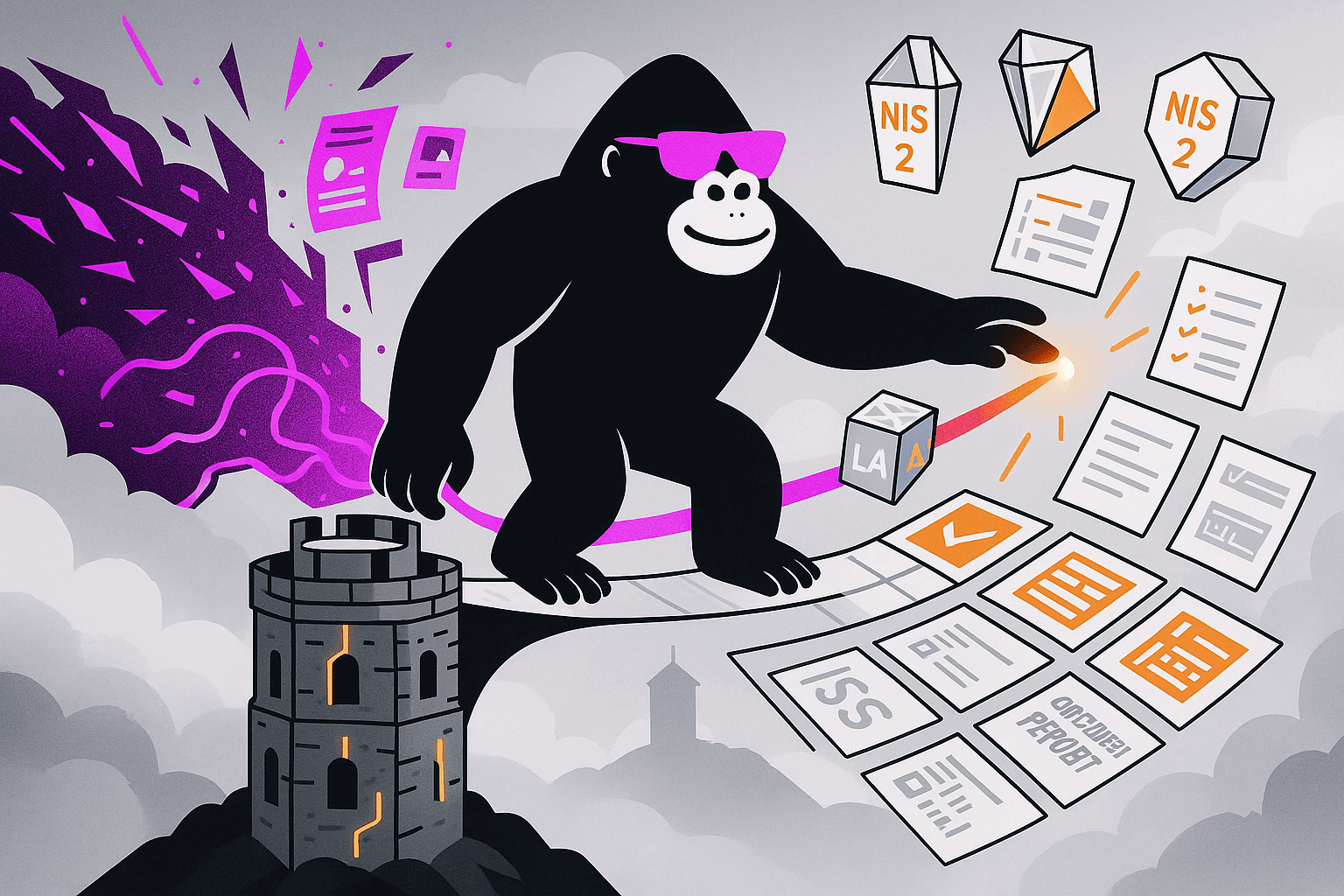Walk into any colocation facility in Vilnius and every second cabinet displays the familiar ISO 27001 logo. Look closer, though, and you will also spot an extra line of initials: LA. That single mark tells regulators, public buyers and cyber-insurers that the certificate was issued by a body recognised by the Lithuanian National Accreditation Bureau – a small detail that carries disproportionate legal weight. The country’s legislators have spent the past seven years layering sectoral rules and cyber-security statutes onto the international standard, turning a global framework into a highly local compliance passport.
In this article I unpack those national overlays, the way information-security leaders stitch them together inside a single management system, and the business rewards that follow.
National overlays and legal anchors
Lithuania keeps the core clauses of ISO / IEC 27001 intact but adds its own checkpoints through accreditation rules, translated standard texts and several acts of parliament. The table below maps the most significant overlays.
Before we dive in, remember that every row in the table may trigger extra documentation or reporting duties during an audit – the fine print matters.
| Overlay area | Why it matters |
| LA-restricted accreditation | Only LA-accredited bodies can issue certificates accepted by regulators or public buyers; certificates are listed in a public LA register for supply-chain checks. |
| National text LST EN ISO / IEC 27001:2023 | From November 2024 every audit must follow the 2023 Lithuanian translation of the 2022 edition; Statements of Applicability are usually bilingual. |
| Cyber-Security Law XII-1428 (NIS-1) | Legacy operators of essential services must keep a risk-based ISMS, notify major incidents within 24/72 hours and pass a two-yearly cyber-audit; ISO 27001 evidence is accepted only when every statutory measure is mapped. |
| Act XIV-2902 and Government Resolution 2690/2024 (NIS-2) | Triples the number of covered entities, introduces board-level accountability and retains an ISO 27001 “presumption of conformity” provided more than ninety prescriptive controls are in place. |
| Secure Public Data Network Law XIV-2662 | Ministries and municipalities must certify their ISMS before joining the state MPLS backbone that comes online in 2026. |
| Sector guidance (telecom 5 G, finance, health) | RRT security rules oblige telcos to file annual risk reports; the Bank of Lithuania benchmarks DORA controls against clause 4-10 artefacts; e-health tenders mandate ISO 27017 / 27018 add-ons. |
These overlays mean that a Lithuanian ISO 27001 certificate is never “plain vanilla”. Every implementing organisation must declare exactly which rows apply and keep matching evidence ready for multiple watchdogs. The next section shows how experienced security managers avoid drowning in parallel check-lists.
PRO TIP
Highlight the November 2024 translation deadline and the 2025 NIS-2 enforcement date in your project plan. Pre-map these milestones to your audit calendar so no legacy certificates or KPI uploads slip through.
Building one management system that satisfies five watchdogs
When I first helped a Vilnius fintech merge its ISO surveillance visit with a statutory NIS audit, the team’s biggest worry was duplicate paperwork. The trick was to treat ISO 27001 :2022 as the backbone and then bolt the national clauses on top, documenting each extra control in a single, regulator-friendly matrix.
The following table captures the workflow that most Lithuanian certification projects now follow.
| Phase | Field note from Lithuanian projects | Regulator pay-off |
| Start with overlays in scope | Pick the base standard, then add Cyber-Security Act, Government Resolution 2690, Secure-Network law or sector annexes only when they really apply. | Clear boundary prevents scope creep and audit disputes. |
| Attach a control-mapping matrix | One spreadsheet links ISO clauses to Resolution 2690 and any sector rules; attach it to the Statement of Applicability. | LA auditors, NCSC-LT and RRT accept the same cross-reference, accelerating reviews. |
| Keep core artefacts in Lithuanian | Risk registers, incident run-books and audit reports in LT (+ EN if useful) satisfy national filing rules without confusing foreign certification teams. | Mandatory for NCSC-LT and RRT incident filings. |
| Synchronise audit calendars | Line up the year-2 ISO surveillance visit with the compulsory two-year cyber-audit and share penetration-test and SIEM evidence across both. | One evidence harvest feeds three certifications, cutting consulting fees. |
| Automate evidence flows | Tag SIEM dashboards and vulnerability scans once, then export metrics to ISO, Resolution 2690 KPI uploads, RRT outage reports and Bank-of-Lithuania DORA forms. | “Collect once – comply everywhere” becomes a reality. |
Following these steps turns the national overlays from a compliance maze into a structured upgrade path. Organisations that master the map soon notice benefits beyond the audit room, especially when they enter public tenders or negotiate cyber-insurance premiums.
PRO TIP
Keep your SoA in a live spreadsheet or GRC tool with checkboxes for each overlay (Cyber Law, NIS-2, Secure-Network, Telecom, Finance). Ticking sectors instantly filters controls—no duplicate matrices needed.
Certification as a commercial catalyst
A Lithuanian ISO 27001 badge is more than a security stamp; it is an entry ticket to public networks, regulated outsourcing contracts and EU funding calls. The table below summarises the tangible returns most boards cite when they sign off the certification budget.
| Impact area | Tangible benefit |
| Tender and cloud eligibility | Government RFPs and the Secure Public Data Network onboarding demand ISO 27001 (often with ISO 27017 / 27018). Without a certificate bids are rejected outright. |
| Regulatory shield | Demonstrates “state-of-the-art” safeguards under GDPR Article 32, Cyber-Security Acts, RRT outage rules and Bank-of-Lithuania DORA guidance, lowering potential fines and shortening inspections. |
| Supply-chain trust | Corporate buyers can verify certificate numbers in the LA register, which often halves vendor-risk questionnaires and speeds contract reviews. |
| Insurance and EU funds | Cyber-insurers discount deductibles, while Horizon Europe and Recovery and Resilience Facility projects grant extra evaluation points to ISO-certified proposals. |
| Operational resilience | The ISO Plan-Do-Check-Act loop dovetails with 24 / 72 hour incident SLAs, quarterly KPI uploads and DORA stress-tests, proving readiness in measurable terms. |
These pay-offs explain why start-ups and municipalities alike now reserve budget lines for certification projects. Yet money is not the only driver. A single, well-maintained ISMS also protects against the legislative wave set to crest when the amended Cyber-Security Act starts full enforcement in late 2025.
PRO TIP
Track two KPIs monthly—“tender success rate” and “incident SLA compliance”—and plot them together. Presenting this chart to the board ties ISO efforts directly to revenue wins and resilience improvements.
One ISMS, many badges
Lithuanian security leaders keep repeating the same mantra: design once, evidence once, publish many times. The local ecosystem rewards organisations that weave national rules into the ISO 27001 fabric instead of bolting them on as afterthoughts.
Done well, the approach delivers a certificate that doubles as proof of GDPR diligence, DORA compliance and NIS-2 readiness. The LA mark on the front page signals that every local nuance has been audited and that the organisation can cross borders inside and outside the EU with confidence.
PRO TIP
Schedule a full dry-run audit six weeks before your next statutory deadline. Simulate NCSC-LT and Bank-of-Lithuania queries in both Lithuanian and English, log any mapping gaps in your risk register, and turn fixes into quick-win evidence updates.
Streamline Estonia’s ISO 27001 overlays with CyberUpgrade
Juggling multiple Estonian overlays—EVS-EN translations, NIS-1 and NIS-2 KPI uploads, Telecom and Finantsinspektsioon reports—can bury your team in duplicate paperwork and last-minute translations. CyberUpgrade automates evidence collection and tagging, feeding SIEM alerts, vulnerability scans and change logs into a central “evidence lake” that populates every statutory report without extra effort.
Real-time compliance checks via our Slack and Teams chatbot guide staff through bilingual incident filings and quarterly KPI reviews, so you never scramble for data when NCSC-EE or the TTA knocks. Built-in workflows for DORA, continuous monitoring, pen-testing and risk assessments ensure you maintain a robust ISMS without relying on in-house experts or manual tracking.
With fractional CISO services providing expert guidance and a fully guided six-step compliance process, CyberUpgrade cuts your compliance workload by up to 80 % and saves over €60 K annually. This lets your team focus on core business growth while staying audit-ready across all Estonian regimes.
Are you building a passport or just a certificate?
A management system that passes an LA-scrutinised ISO 27001 audit today already covers roughly eighty per cent of the controls that Lithuanian regulators will check under NIS-2 tomorrow. The remaining twenty per cent are largely process tweaks, not additional infrastructure. The decision is therefore straightforward: invest once in an integrated ISMS and treat every new regulation as an incremental patch, or chase each rule in isolation and pay the same consulting bill five times.
Lithuania’s fast-moving legal landscape gives clear signals which path makes strategic and financial sense. The real question is whether your organisation reads those signals early enough to act.









